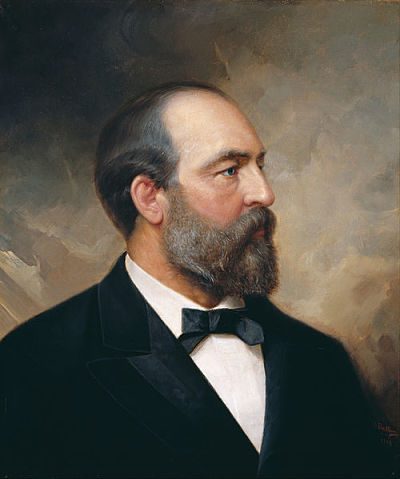 Tomorrow I will vote in the Texas Republican Primary. I told my team yesterday that I thought college presidents that “endorsed” in a primary like Mr. Falwell at Liberty University made a mistake, so I will not reveal my candidate. However, I am going to tell you how I will choose my candidate by referring to a little book I picked up on the way to Grant’s Tomb: Garfield’s Words.
Tomorrow I will vote in the Texas Republican Primary. I told my team yesterday that I thought college presidents that “endorsed” in a primary like Mr. Falwell at Liberty University made a mistake, so I will not reveal my candidate. However, I am going to tell you how I will choose my candidate by referring to a little book I picked up on the way to Grant’s Tomb: Garfield’s Words.
This is not the wisdom of a lasagna loving cat, but the President who inspired a book of quotations on politics in 1881 dedicated to: The Many Thousand Men and Women of this Republic whose lives have been made better and nobler by the martyrdom of James Abram Garfield.
James Garfield was killed, in part, because he attacked the cronyism and “spoils” system of his day. Today his goal would be to clean out the lobbyists and the corruption of our day. I am looking for a candidate whose life in politics will make our lives as citizens in the Republic better and nobler.
Garfield’s creed sums up my own political life: I would rather be beaten in Right than succeed in wrong.
I am looking for a candidate of principles. Garfield formed his political ideas over a lifetime of classical education and teaching. We need a candidate who will stand for the right without hesitation or checking poll numbers as Hillary Clinton does.
Garfield said: I am trying to do two things- dare to be a radical and not to be a fool which if I may judge by the exhibitions around me is a matter of no small difficulty.
Garfield knew that Victorian era Republicanism had become rotten with graft. He knew things had to change, radically change, but he was no fool. He did not want to burn down the Temple of the Republic, just chase out the money lenders. I am looking for a man brave enough to take a whip to the establishment, but not a blowtorch.
Garfield was (perhaps) the most pious man to hold office, but prayed: I would rather be defeated than make capital out of my religion. This did not mean failure to testify to the importance of Christianity in his life: This public life is a weary, wearing one, that leaves one but little time for that quiet reflection which is so necessary to keep up a growth and vigor of Christian character. But I hope I have lost none of my desire to be a true man, and keep ever before me the character of the great Nazarene.
I will vote for a person who is a person of character, following the Great Nazarene, but not a man who wishes to make money or abuse religion for office. It is a fine line. A good man must be willing to be open about the influence of his Faith without inspiring theocratic or demagogic tendencies in the public.
Garfield claimed: It is not right or manly to lie, even about Satan.
No candidate is perfect. I will vote for the person in public life who has told the truth the best he could.
Garfield understood the enduring things: The principles of ethics have not changed by the passage of years.
A man should not measure his ethics with the calendar or by what is trendy. Science can tell us what is, but not what ought to be. I am looking for a candidate who has shown over the course of his life a constant desire to live by the enduring truths . . .amongst these truths the right of every person to life, liberty, and human flourishing.
The bad politician was the man whose political opinions do not “live longer than my dog.” Garfield understood that the mature statesmen must come to his core ideals over time and then practice them in practical politics.
I am looking for a Republican who knows the system, but is not owned by the system and whose beliefs are older than my beta fish.
Garfield knew the difference between an ideologue and a man of character: Not a man of iron, but a live oak.
I will not vote for the man who never changes his mind or is not still growing intellectually. I will not vote for the man of certainty or iron: that is the direction of tyranny. The man of character endures like oak, but like a living oak still reaches up towards Heaven. A live oak can lose a limb in the struggle of life and still grow stronger.
I am looking for a live oak.
Garfield urged an education classical, practical, and civil. He wanted all Americans (including women!) to be able to follow an argument and understand the culture. Garfield believed: Ideas outlive men.
I am looking for a candidate who reads. I am looking for a candidate who is a man of ideas, but can apply those ideas practically. The brave man who knows that “the cause that triumphs on the battlefield does not always triumph in history.” Garfield feared voters who were not “illuminated by education.”
My vote will go to a man with a plan, who can explain the plan, and who knows how to implement the plan.
Garfield rose from poverty to power, but he never forgot his roots. He said: There can be no permanent disenfranchised peasantry in the United States.
I am looking for a candidate who can appeal to rich and poor. Garfield loved the poor and could speak with them. I am looking for such a man.
Garfield hated rhetoric detached from reality. He said: Perhaps it is true that the demagogue will succeed when honorable statesmanship will fail. If so, public life is the hollowest of shams.
Republican forms of democracy often fail. As Plato points out, they fail when the populace is seized by a desire to listen to a demagogue who says: “I will give you what you wish painlessly.” No Republican can or should vote for a demagogue. This is particularly true when it comes to money and spending: “Financial subjects are nuts and clover for a demagogue.” Garfield means that outlandish promises about balancing the budget easily or giving us financial treats like Senator Sanders attract a demagogue like a nerd who must go to ComicCon.
We must search for a statesman: a man who puts principle above party.
Garfield experienced the fact that slavery did not end with emancipation: All along the coast of our political sea these victims of slavery lie like stranded wrecks, broken on the headlands of freedom.
Garfield knew these lives mattered. He said again and again that the freedman must be helped. We did not heed Garfield and so the ruin of Jim Crow and segregation . . . still practiced in my childhood must be faced. My candidate will fight the racism that still exists and create a Republican Party open to every American.
When I stood holding Garfield’s book at Grant’s tomb yesterday, I realized how short history has been. My great-great grandfather voted for both men. Why? He believed in Union, limited government, sound finances, and liberty. My forefathers and mothers rejected slavery, demagogues such as Bryan, and Eastern racists like Woodrow Wilson. They would vote against Wall Street for main street with Teddy Roosevelt and for busting up parasitical government and big business combines under Howard Taft.
I will never vote for Party over principle or confuse my duty to the Republic with a deeper duty to Christendom. I will vote for the candidate that has some hope of standing with Lincoln, Grant, Garfield, McKinley, Roosevelt, Taft, Coolidge, and Reagan without shame.
Never, not now or in the general election, vote for anyone who cannot say: Victory is worth nothing except for the fruits that are under it, in it, and above it.
The Reynolds and Combs foremothers and fathers left me a trust in family history. I vowed to President Grant at his crypt and Garfield as I read his words that in 2016 I would keep the trust by voting as I have been taught. So help me, God.











